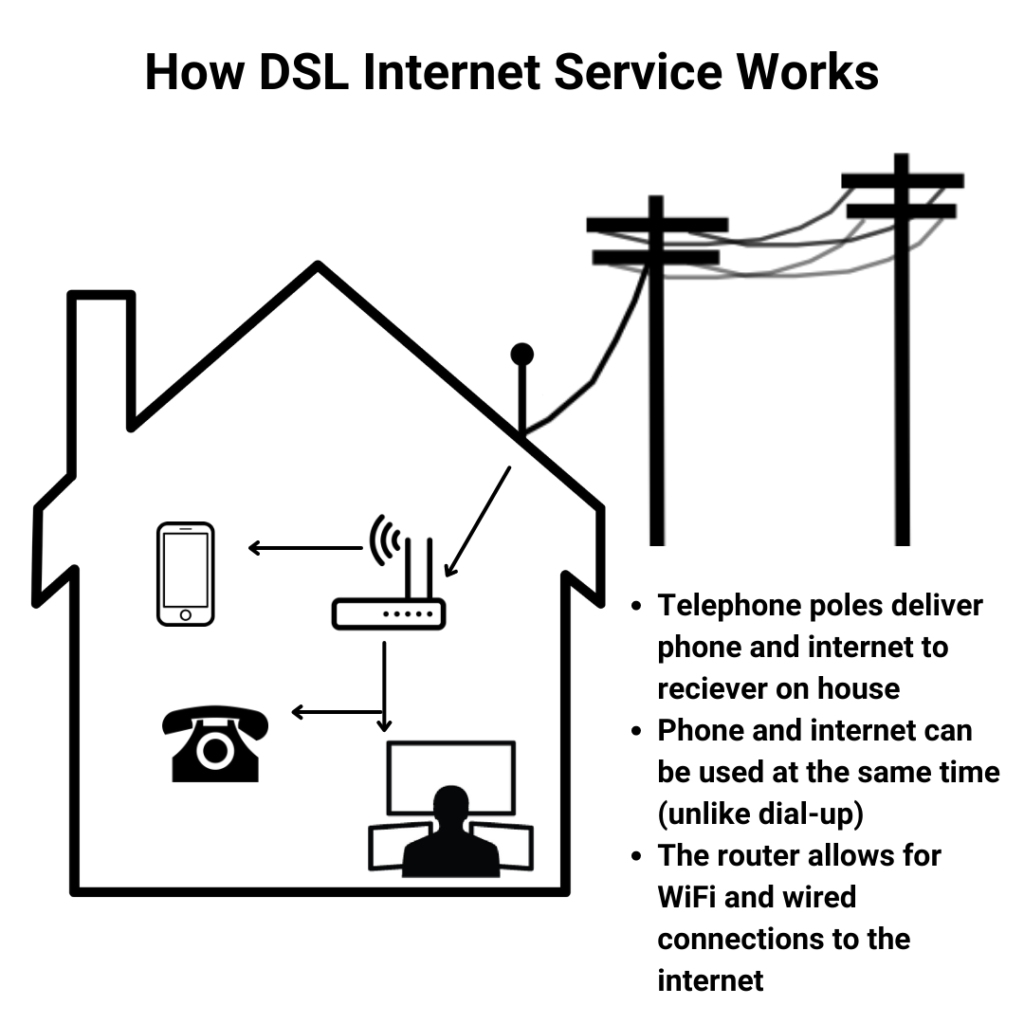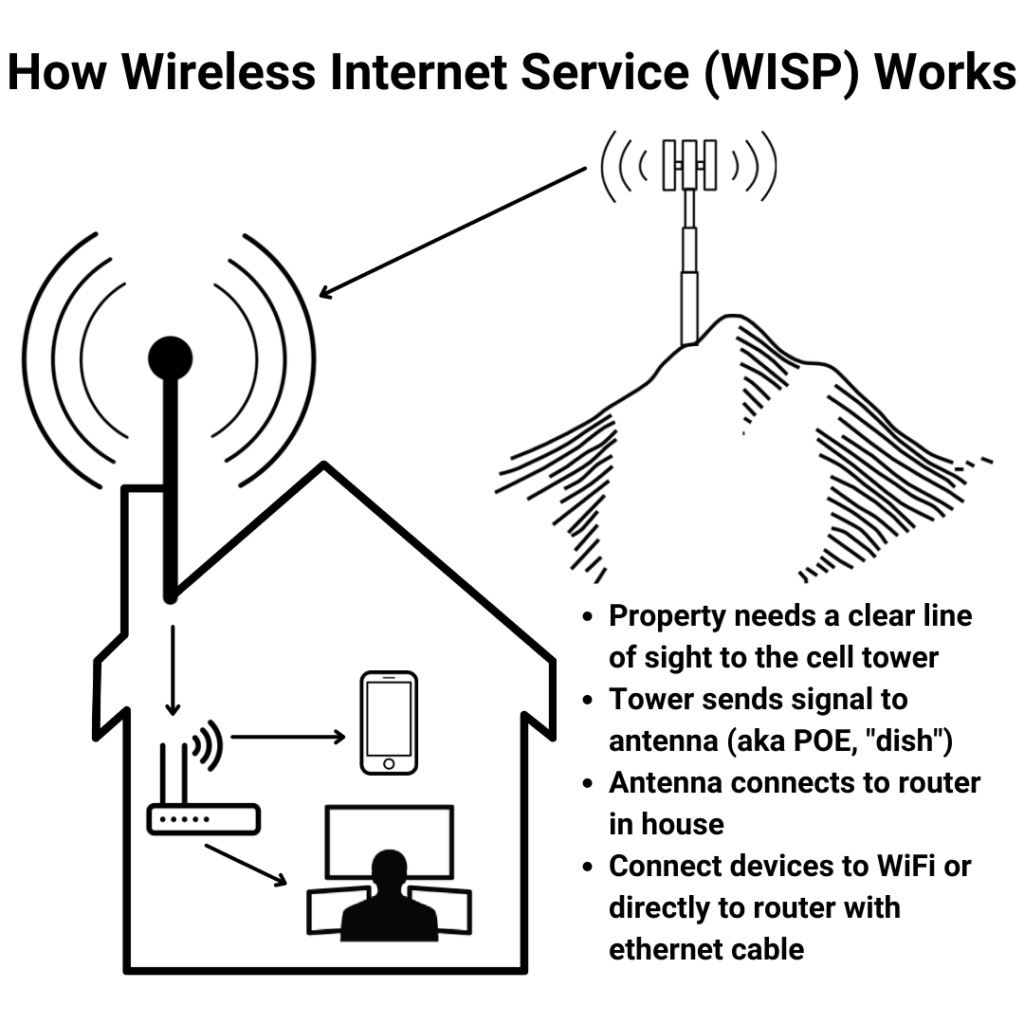There are many factors to consider when choosing an internet service plan. Customer service is important, but so is getting the right type of internet, the right speeds, and sufficient data allowances. It’s good to start by understanding the different options that are out there and the different circumstances they are best for. In this article, we will explain all of the different types of internet services and the features that differentiate them.
Tip: Be sure to call ISPs before moving to a rural location (or buying a property) to make sure you can get the service you need!
Overview of Internet Service Plan Considerations
- Speed requirements vary based on how you use the internet AND how many people use it simultaneously
- “Broadband” internet can apply to many different internet delivery methods
- “Broadband” does not always mean the best speed or service
- Phone lines, cable lines, wireless signals, and satellite signals are the four main internet delivery methods
- Fixed wireless internet is a great way to get fast and reliable internet service in rural locations
Common Questions About Internet Speed
Internet terminology can get confusing. Here are some answers to common questions about internet speed to help you understand your internet service better.
What is considered to be high-speed internet?
In March 2024 The FCC raised the definition of broadband internet to a connection speed of at least 100 Mbps download and 20 Mbps upload, a four-fold increase from the previous definition of 25 Mbps download and 3 Mbps upload. That said, high-speed internet is not a defined term. It may be applied to lower connection speeds. Fast internet will depend on how you use the internet and how many people and devices use your internet at a given time.
Is high-speed internet access the same as WiFi?
High-speed internet access is not the same thing as WiFi. High-speed internet access is the actual internet service. WiFi is the way you utilize that service. You can also access your high-speed internet by connecting to your router directly with an ethernet cable.
What is the difference between broadband and internet?
The difference between broadband and internet is that broadband is a particular speed that your internet connection may (or may not) reach. The internet itself can move at different speeds.
Do I have a broadband internet connection?
You have a broadband internet connection if your internet speeds are at least 100 Mbps download and 20 Mbps upload.
Is a 100 Mbps fast internet?
100 Mbps is a fast internet connection that is able to support multiple devices, streaming, gaming, smart home devices, email, web browsing, and video conferencing. However, most people can experience a fast internet connection with much lower speeds.
What percentage of the population is without broadband internet options?
The FCC’s Eighth Broadband Progress Report points out that approximately 19 million Americans still lack access to broadband internet.
What Internet Speed Do You Need?
When it comes to internet speed, you hear most about download speed. That is the speed it takes you to retrieve something from the internet. In some cases, you also need to consider upload speed. Upload speed is the speed at which you send information to the internet. Megabits per second (Mbps) describes internet speeds.
| Usage Habits | Download Speed | Upload Speed |
| Light Use/Browsing | 1-5 Mbps | 1-3 Mbps |
| Students | 5-10 Mbps | 1-5 Mbps |
| Telecommuting | 5-15 Mbps | 3-5 Mbps |
| Online Gaming* | 1-5 Mbps | 1-5 Mbps |
| HD or SD Video Streaming; Smart TV | 5 Mbps per Screen | NA |
| Ultra-HD or 4K Video Streaming | 25 Mbps per Screen | NA |
Generally speaking, upload speeds are 1/10th of download speeds. For telecommuting and gaming, you may want more upload speed for Zoom meetings and multiplayer online games. The FCC Household Broadband Guide is a great resource to help you understand your internet needs.
Webformix internet plans consider all of these factors. Plans can be customized to add more upload speed if needed. There are no data caps, no contracts, and no hidden fees.
Best Internet Service Plan for Gaming
When considering what type of internet service plan you need for gaming, it is important to know the different types of games and the different requirements they have. As noted above, 5 Mbps or more is enough to download a game from the internet. When you play a game that is downloaded, you do not need much download speed. You do need more upload speed since you want your actions to occur “in real-time.”
If you play games that are streamed, it is similar to streaming video! That means significantly more bandwidth is used. The best internet plan for gamers is going to depend on the type of games. You’ll want to think of streamed games as similar to video streaming and be aware that those types of games will leave less bandwidth available for other devices and internet users in your household.
Best Internet Service Plan for Streaming Video
Streaming video in standard definition (SD) or high definition (HD) takes up about 5 Mbps of download speed per screen. That means if two people are streaming video simultaneously, it requires about 10 Mbps, or 15 Mbps for three streams. So when you pick your internet plan you must consider if your kids are streaming cartoons while you are streaming Netflix because that would require 10 Mbps instead of 5 Mbps.
When it comes to watching a video in ultra-high definition or 4K, you’ll need a very robust plan that offers at least 25 Mbps download speeds. If internet plans with such high speeds are not available to you, you can change the video settings to adjust the video quality to SD or HD if Ultra-HD or 4K consume too much bandwidth.
Unlimited Bandwidth vs Data Caps
Data caps are a limit that an internet service provider places on internet usage. These caps are intended to discourage excessive use by “throttling” (limiting) the amount of data you can transfer online. A data cap of 1 terabyte (TB) usually is not problematic for most users. That is enough data for you to binge 99+ hours of Netflix in high definition (HD) three times in a month. One hour of video streaming can use up to 3 GB of data in standard definition (SD) or high definition (HD) (4k video streaming uses roughly 7 to 14 GB of data per hour).
However, some internet service plans have data caps at lower levels that can be problematic. What’s worse is that you can get charged extra for going over your data cap if you are not careful. Unlimited bandwidth internet plans are plans that do not have data caps and will not throttle your internet speed. Be very careful when choosing plans because an ISP may advertise that they provide unlimited bandwidth, but it may not apply to all of their plans!
Latency vs Internet Bandwidth
To determine what you need in an internet service plan, you need to consider your habits for downloading, uploading, streaming, and overall internet bandwidth use. We’ve talked about speeds and bandwidth, but you should also be aware of a factor called latency. Latency is a delay in data transfer that impacts online gaming and streaming. If you have a lot of latency, it may take videos a long time to buffer or take a long time for web pages to load. In addition to your use habits, you’ll need to consider the number of people and the number of devices in your household as well. The more simultaneous internet users there are in your household, the more capacity your plan may need (and the more latency may be an issue).
Causes of Latency
- Satellite internet where the signal needs to travel a long distance
- “Oversubscribed” DSL internet where too many subscribers in a particular area using the internet at the same time
- Too many simultaneous internet users in a household at the same time (may be fixed by increasing service tier)
- Connecting to the internet via WiFi instead of direct connection to the router via ethernet cable
What Types of Internet Service are Available?
You’ll notice that the main difference between all of the different types of internet service is mainly in how they move data. Some work through phone lines, others through cable lines, satellites, or communications towers. Each type of internet has its pros and cons, but not all types are available in all locations.
Dial-Up Internet
Dial-up is old-fashioned internet that works via phone lines. It is not in current use except in very rare circumstances. Dial-up internet is very slow and should only be used as a last resort.
Broadband Internet
Broadband internet generally refers to any high-speed internet access that is always on and faster than dial-up access. The FCC requires it to have at least 100 Mbps download speed and 20 Mbps upload speed (Mbps means Megabits per second). Wireless Internet, DSL, Cable, Satellite, and Fiber-Optic Internet are all types of services that are capable of offering broadband internet services. Whether you actually get “broadband” speeds from the “broadband” company depends on the actual service plan you select.
DSL (Digital Subscriber Line) Internet
DSL internet can be delivered simultaneously with wired telephone service on the same telephone line. This is possible because DSL uses higher frequency bands for data. With DSL, a DSL modem is hooked up to a phone line which the phone company connects to a DSLAM (concentrates customers). The customer needs to be located within range of the DSLAM which usually encompasses a few residential blocks. DSL can be available in rural locations, but the farther you are from the DSLAM, the slower your speeds will be regardless of the plan you select. You may also experience latency issues if the DSL company does not have enough bandwidth to accommodate all of its users at peak usage times.


Cable Internet
Cable internet is a form of broadband internet access and it uses the same infrastructure as cable television. It is usually integrated into the cable television infrastructure. It works in a similar way to DSL but has the potential for faster speeds. The main difference between DSL and cable internet is that DSL connects to a phone line. Since fewer people have landlines, cable internet is available through your cable connection (coaxial cable).
Is there an alternative to cable internet?
Alternatives to cable internet include fiber internet, DSL internet (phone line), fixed wireless internet, mobile wireless internet, and satellite internet.
What is better: Satellite or cable internet?
Cable internet is a better option than satellite internet. Cable internet is capable of faster speeds, is less expensive, and is more reliable.
Fiber-Optic Internet Service
Fiber-optic internet, or “fiber,” is one of the newest advances in internet technology. Simply put, it is super fast! Fiber internet is unique because it transmits information in the form of light rather than electricity. Fiber internet availability is limited, but it can be a great option where it is available.
Satellite Internet Service
Satellite internet is an option mainly used for rural areas. While some satellite internet services are capable of “broadband” speeds, there may be issues with latency (delay in information transfer). To get the internet to your location, signals are sent to satellites in space. Then the signal returns to you via a satellite dish at your location. Satellite internet can be faster than DSL, but cable internet and wireless internet are generally faster than satellite. This is because no space travel is needed.
Your Satellite Internet Questions Answered
You can get internet through satellite, but it tends to be expensive and slower than more traditional internet services.
You can get high-speed internet with satellite, but it is often very expensive and can still have high latency and data caps.
Unlimited satellite internet plans generally still impose a monthly threshold. This means that their plans will decrease your speed and lower the priority of your data transfers (internet use) once you hit that monthly threshold. With Webformix, you get a more reliable internet service that does not have any data caps or thresholds. Fixed wireless internet from Webformix is truly unlimited.
Fixed wireless internet is better than satellite because it has lower latency, is not disrupted by weather, offers truly unlimited data, is cheaper, and has better customer support. Fixed wireless is especially better than satellite for gaming and streaming video.
Satellite internet is not better than DSL for most internet clients. Even in rural locations, DSL internet is usually cheaper, faster, and more reliable.
Satellite internet is not as fast as cable internet. While the two can have similar download speeds of 20 Mbps to 100 Mbps, satellite internet has slower upload speeds, higher latency, and can experience outages in poor weather conditions.
You can get broadband through a satellite dish, but broadband speed satellite internet service tends to be very expensive and has data caps.
Satellite internet is not available in all locations. While you can get satellite internet almost anywhere, you’ll need to check with the different providers to find out which one is available in your specific location. Portable satellite internet is different from traditional satellite internet. If you want to travel with satellite internet you would need a satellite internet hotspot.
Satellite internet is not the same as WiFi. Satellite is a type of internet service where the signal travels to space. That signal is delivered to your devices through a wireless router that provides WiFi connectivity. Some types of satellite internet do have a built-in router on the satellite dish.
You can get WiFi through satellite internet, just like with any internet service.
Fixed Wireless Internet Service
This is where Webformix comes in! Wireless internet service utilizes communications towers. It can also be called "fixed wireless internet," or "wireless broadband" and is abbreviated as "WISP." Wireless internet is a great internet option for rural locations and small towns. The only catch is that you need to have a line of sight to the location of the communications tower the WISP is established at. In some cases, a tree installation may be the only option for installation. Wireless internet speeds are comparable to other broadband services. Many fixed wireless internet companies are small local businesses as well, so by using their services you are supporting your local community.
Does weather affect fixed wireless internet?
Unlike satellite internet, the weather does not affect fixed wireless internet.
Mobile Wireless Internet
Large cell phone companies do also offer mobile wireless internet. Unlike fixed wireless internet, mobile wireless uses portable hubs. They can be somewhat spendy and do not always have the most dependable and fast performance. Quality and consistency are better with fixed wireless internet service.
What is the difference between fixed wireless and mobile wireless?
Both fixed wireless and mobile wireless internet work via cellular communication towers. However, fixed wireless internet connects the client to just one tower and the connection cannot travel. Mobile wireless internet provides clients with a hotspot that they are able to take anywhere. That is what makes mobile wireless internet a good option for nomads and emergency workers.
What is fixed wireless phone?
A fixed wireless phone is also called VoIP. VoIP is a phone service that works over your internet connection. This is different from a wireless phone which is the same as a cell phone.
5G Wireless Internet Service
If you have seen companies offering "5G Wireless Internet," be careful to get the specifics. 5G is short for 5th generation LTE technology, but some unscrupulous companies will use the term for 5 GHz (radio frequency). Cell phone companies may offer 5G mobile wireless internet, and it is possible to get 5G fixed wireless internet. However, 5G fixed wireless internet is not common currently.
Specifically, there is no 5G internet service or cell service in Bend, OR, or Grants Pass, OR at this time. Hypothetically, a company could put up their own 5G tower in the area, but that would be cost-prohibitive. Be sure to ask what exactly internet companies mean by "5G." Check to see if there are actually any 5G towers in your area, and see who is authorized to operate on those communications towers.
Deciding on an Internet Plan
If you are having a hard time deciding on your options, the first thing to do is find out the type of internet service offered to your location. Next, you can note how many people will be using the internet, how many devices will be used at the location, and what type of uses (gaming, streaming, telecommuting). With that information, you will be well prepared to call up the internet service providers and compare what they have to offer you.



Recent Comments